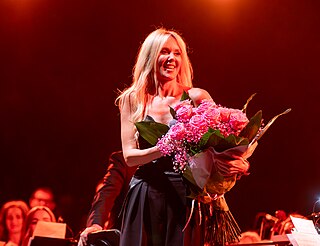Telecommunications in Poland include radio, television, fixed and mobile telephones, and the Internet.

Orange Polska is a Polish telecommunications provider established in December 1991. It is a public company traded on the Warsaw Stock Exchange, with a controlling stake owned by Orange S.A., the latter controlling over 50% of this stake by 2002. It operates the following services: PSTN, ISDN, GSM 900/1800 network, ADSL, IDSL, FTTH fibre Internet, Frame Relay, ATM and Inmarsat.
P4 sp. z o.o., known as Play, is a Polish telecommunications company. Play was founded as a mobile telephony operator in 2007 and has gradually increased its local market share in mobile, up to 27% as of 2017. In September 2020, Play became part of French Iliad. Before being sold, Iceland's Novator Partners, led by Icelandic businessman Thor Bjorgolfsson, acquired a large stake in the company. As of November 20, 2020, Iliad owns 96,66% of Play.

Milionerzy (Millionaires) is a Polish game show based on the original British format of Who Wants to Be a Millionaire? The show is hosted by Hubert Urbański. The main goal of the game is to win 1 million Polish złoty by answering twelve multiple-choice questions correctly. There are three classic lifelines – ask the audience, fifty fifty and phone a friend – and also two other lifelines – ask the expert and switch the question. From March to December 2010 contestant could choose risk game, where the second guaranteed sum was not guaranteed. The first version of Milionerzy was broadcast from 3 September 1999 to 26 January 2003, the second version was broadcast from 19 January 2008 to 19 December 2010, and the third version has been broadcast since 9 February 2017. Since 2017, it is shown every Monday to Thursday at 8:50 p.m. or 8:55 p.m. on the Polish commercial television station TVN. Since 2008, when a contestant gets the second question correct, they will leave with 1,000 zł. When a contestant gets the seventh question correct, they will leave with 40,000 zł.
Television in Poland was introduced on an experimental basis in 1937. It was state owned, and was interrupted by the Second World War in 1939. Television returned to Poland in 1952 and for several decades was controlled by the communist government. Colour television was introduced in Poland in 1971. Private television stations in Poland appeared around the time of the fall of communism, with PTV Echo becoming the first private station in Poland.

X Factor was a Polish talent show based on a British show The X Factor and broadcast on TVN. The first series premiered on 6 March 2011. On 27 November 2010, during the season 3 finale of Poland's Got Talent, Marcin Prokop confirmed that the auditions would be held in January 2011. That was also the first public statement from TVN about X Factor.
Platige Image S.A. is a Polish-based company specializing in the creation of computer graphics, 3D animation, and digital special effects for various fields, including advertising, film, art, education, and entertainment. The studio employs a team of over 320 artists, comprising directors, art directors, graphic designers, and producers. The company has won approximately 280 awards and honors. Its animated shorts have garnered top prizes at SIGGRAPH four times and earned two British Academy of Film and Television Arts (BAFTA) awards. Additionally, the studio has been nominated for the Palme d'Or at the Cannes Film Festival and the Golden Lions at the Venice Film Festival, as well as receiving an Oscar nomination.

Joanna Krystyna Klepko, known by her stage name Cleo, is a Polish singer. She represented Poland in the Eurovision Song Contest 2014 in Copenhagen, Denmark along with Donatan with the song "My Słowianie".

Warsaw Shore or Warsaw Shore: Ekipa z Warszawy is a Polish reality television series broadcast on MTV Poland. Based in Warsaw, it was first broadcast on 10 November 2013, and is the Polish spin-off of the American show Jersey Shore.
The fifth season of The Voice of Poland began airing 6 September 2014 on TVP 2.

Katarzyna "Kasia" Moś is a Polish singer, songwriter, and dancer. She was previously a member of The Pussycat Dolls Burlesque Revue in 2011, and in 2012, she came third in the third series of the Polish version of Must Be the Music. She represented Poland in the Eurovision Song Contest 2017 with the song "Flashlight", and finished in 22nd place.

Wiktoria "Viki" Gabor is a Polish singer. She began her career in 2019, as a runner-up on the second season of The Voice Kids Poland, and then later won the Junior Eurovision Song Contest 2019 with the song "Superhero". She is the second Polish entrant to win the contest, and her win marked the first time a country had won the contest twice in a row, and on home soil.

Jarosław Rafał Gugała is a Polish radio and television journalist, actor, musician, university teacher, from 1999 to 2003 serving as an ambassador to Uruguay.
Poland participated in the Eurovision Song Contest 2023 in Liverpool, United Kingdom, with "Solo" performed by Blanka. The Polish broadcaster Telewizja Polska (TVP) organised the national final Tu bije serce Europy! Wybieramy hit na Eurowizję! in order to select the Polish entry.

Krzysztof Jan Gonciarz is an internet creator, filmmaker, journalist, and YouTuber, responsible of the channels Zapytaj Beczkę, Krzysztof Gonciarz, and TheUwagaPies on YouTube. He is the owner and creator of Japanese-based filmmaking company Tofu Media. He formerly worked as a journalist for Gry-Online.

Bilguun Ariunbaatar is a Mongolian-Polish television presenter, musician, and actor. He was a singer in the rock band Lavina.

Telewizja Republika or TV Republika is a Polish television station, whose editor-in-chief is Tomasz Sakiewicz. The channel can be received via satellite, via the Internet and terrestrial in the DVB-T system, as well as in the DVB-T2 system. From 2022, the channel broadcasts its program 24 hours a day. The live portion of its output in Polish is broadcast every day for 16 hours, from 7:00 a.m. to 11:00 p.m., while between 11:00 p.m. and midnight, the programs of the English-speaking editorial staff of the channel are broadcast.

Media Expert is a Polish chain of stores specializing in consumer electronics and home appliances. Founded in 2002, it is operated by TERG S.A., a company based in Złotów.












